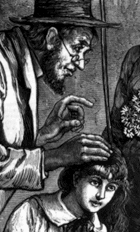The Phrenology ExhibitThe Lost Museum Archive

“Professor” Livingston was the American Museum’s phrenologist -- a vocation he adopted after a less successful run as an actor. For a nominal fee, he inspected museum visitors’ heads and provided analyses of their characters and talents. Phrenology was a popular nineteenth-century science of determining a person’s mental strengths, abilities, and personality traits from the shape of the skull. It was founded in Germany in the 1790s by Franz Joseph Gall and J. G. Spurzheim and gained popularity among upper-class intellectuals and scientists in Britain in the 1820s. As theories of phrenology spread to the U.S. in the 1830s, they merged with the reform-oriented and commercializing culture of Jacksonian America and moved from the realm of scholarly research into a more practical and popular science that focused on self-improvement. From the 1830s into the 1880s, thousands of traveling phrenologists toured the country "reading" character strengths and weaknesses and offering advice on how to overcome personal shortcomings. During the antebellum years geographic mobility, economic expansion, and the growth of cities undermined reliance on personal contacts and references among the middle class. Phrenology’s popularity - along with physiognomy, pathognomy, and other "sciences" based on reading innate character from bodily signs - spoke to the need and desire for practical ways to judge others in a society that was becoming more anonymous. Supporters of phrenology argued its value in selecting marriage partners, career choices, the hiring of employees, child rearing, as well as criminal detection and rehabilitation. Phrenology’s main proponents in the U.S. were Orson and Lorenzo Fowler, who promoted phrenology as a self-improvement practice along with other popular forms of moral and health reform such as vegetarianism, temperance, mesmerism (contact with the spirit world), and hydropathy (water cures). Although phrenology appealed to advocates of biological determinism, nineteenth-century reformers also argued that people could overcome mental shortcomings through self-improvement techniques - in Orson Fowler’s phrase: "Self-Made or Never Made."